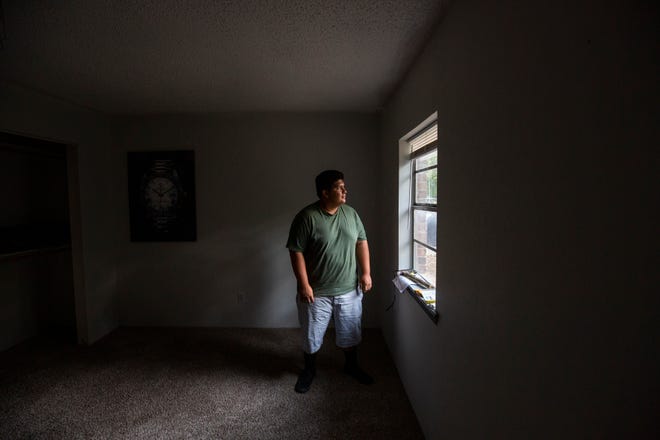Leo Medina was working an overnight shift at the Dallas hospital where he works when the news hit him: A federal appeals court in New Orleans had struck a severe blow to Deferred Action for Childhood Arrivals, the Obama administration-era policy that protects undocumented people brought to this country at a young age.
The news was a blow nationwide for thousands of DACA recipients, Medina included, and those eligible for DACA. It struck a particularly sharp note in his mixed-status family: While he has DACA protection, his younger brother, Carlos Medina, also brought to the U.S. as a minor, does not. After Wednesday’s ruling, Carlos Medina’s hopes of receiving DACA dimmed to a flicker.
“Devastating,” Leo Medina, 24, said. “To me, my family’s everything. Doing everything together makes us stronger. Seeing him struggling will make it devastating for the both of us.”
The decision from a three-judge panel of the U.S. Court of Appeals for the 5th Circuit sent shockwaves to DACA-eligible recipients across the United States, including families with both DACA recipients and DACA hopefuls, like the Medinas.
The panel agreed with a lower court ruling that DACA, which has protected hundreds of thousands of young immigrants from deportation and allowed them to legally work, was unlawful but said current recipients could continue to renew their status every two years, as required by the program. It sent the case back to a Texas courtroom to decide on a new Biden administration regulation on the program.
Created by President Barack Obama in 2012 as a temporary solution until Congress passed more permanent legislation, DACA has protected more than 800,000 recipients over the past decade. Today, more than 611,000 people are in the program. Another 80,000 have applied for DACA but their applications are in limbo while the case plays out in court.
The DACA-eligible population earned $23.4 billion in 2017, up from almost $19.9 billion in 2015, according to a report by the New American Economy, a research fund. More than 93% of DACA-eligible individuals were actively employed in 2017.
Biden administration officials denounced the ruling and called on Congress to pass legislation to protect immigrants brought to the United States at a young age.
“I am deeply disappointed by today’s #DACA ruling and the ongoing uncertainty it creates for families and communities across the country,” Homeland Security Secretary Alejandro Mayorkas said in a tweet. “We are currently reviewing the court’s decision and will work with @TheJusticeDept on an appropriate legal response.”
Texas Attorney General Ken Paxton, a Republican who filed the initial lawsuit against DACA, also used Twitter to herald the decision. “The appeals court just AFFIRMED my team’s trial court win,” the tweet said. “DACA—part of Dems’ program to flood our country with aliens—is illegal & will stay enjoined. Huge victory for the Rule of Law in America!”
Government lawyers could appeal the 5th Circuit Court’s decision to the U.S. Supreme Court. But the high court’s conservative makeup could risk justices there abolishing the program all together, said Lindsey Harris, a Houston immigration attorney who represents DACA recipients.
Former President Donald Trump tried to dismantle the DACA program in 2017 but in a case decided by the Supreme Court three years later, a 5-4 majority said the Republican president didn’t follow the law in ending the program. In that case, Chief Justice John Roberts joined with four liberal justices to allow the policy to continue.
Today’s Supreme Court, which enjoys a 6-3 conservative majority, could return a very different ruling, Harris said.
“DACA is definitely in jeopardy at this point,” she said. “It is a different Supreme Court, if and when we get there. It seems likely they could end it.”
Gaby Pacheco, director of advocacy at TheDream.US, which supplies scholarships to immigrant youths, said her organization posted a message via social media after Wednesday’s ruling offering support to scholars.
As conservative administrations and states continue to attack the program, DACA recipients live in a constant state of siege, she said. Many DACA recipients have started families of their own and their fear extends to their spouses and children, Pacheco said.
“They’ve grown up here, they feel they’re American, this is their country, but they’re constantly being reminded otherwise,” she said. “It’s heartbreaking that people are living court case to court case, administration to administration.”
Leo Medina said he plans to have a long talk with his brother, Carlos, to discuss Wednesday’s ruling and brainstorm alternative plans. The brothers were brought to Texas by their parents from Mexico as minors. Leo Medina was accepted into DACA in 2014, giving him protection from deportation and allowing him to land well-paying jobs.
Carlos Medina, 21, applied for the program last year, but his application was frozen when the case went to court. He’s been able to hold only menial jobs with his father at construction sites and is at risk of being deported each day.
“I’m bummed out,” Carlos Medina said. “I was basically putting all my hopes into [DACA]. I hoped it would give me better work opportunities, better life opportunities, better overall living.”
The Medina family’s struggles are being felt nationwide — 1.5 million people live with a DACA recipient, according to the Center for American Progress.
Wednesday’s ruling brings a fresh urgency to the stress the family has been living under for years, Leo Medina said.
“We want the same thing as everyone else at the end of day,” he said. “We want better jobs, better opportunities, a better life. No one wants to struggle. We’re here to better ourselves.”
Follow Jervis on Twitter: @MrRJervis.


